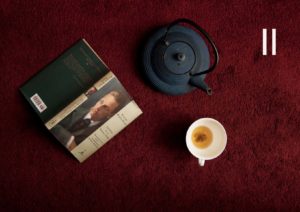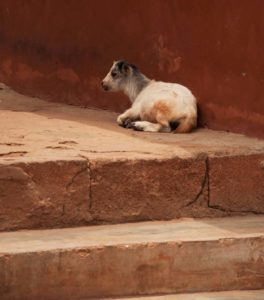And your doubt can become a good quality if you train it. It must become knowing, it must become criticism. Ask it, whenever it wants to spoil something for you, why something is ugly, demand proofs from it, test it, and you will find it perhaps bewildered and embarrassed, perhaps also protesting. But don’t give in, insist on arguments, and act in this way, attentive and persistent, every single time, and the day will come when, instead of being a destroyer, it will become one of your best workers––perhaps the most intelligent of all the ones that are building your life
(Rainer Maria Rilke. Letters to a Young Poet. Trans. Stephen Mitchell. NY: Modern Library, 2001, p. 102).
If faith moves mountains then does doubt sinks feathers? Since one can argue that feelings and thoughts are neither good nor evil in of themselves but rather the manner and purpose for which they are used render them beneficial or toxic, can one say it is wrong to feel doubt? Yet still, in the realms of the intellect and emotions, the moderate is favorable to the extreme. Hence is moderate doubt hurtful or advantageous? What can be done with Rilke’s doubt in the passage above, found in the ninth chapter of Letters? Is it active or passive? Moderate or extreme? Harmful or constructive? In this penultimate commentary in my essays on Rilke’s Letters to a Young Poet I briefly contemplate doubt as “destroyer” and a “best worker” and also consider Rilke’s mindful procedure in dealing with the feeling.
To recognize doubt in oneself may generate different levels of frustration depending on the strength of the emotion and what it attacks in one’s reality. Yet to identify a feeling of doubt within the self is not necessarily a bad thing. It is an announcement of uncertainty, a suspension in a state where one is unsure what step to take. Thus a decision must be made and choice reflects an act of faith or belief. But what if doubt circulates around some of the bigger questions in life like how the world came to be and the purpose of the human being? What if doubt becomes a safety measure that protects an intellect from the awe of the ungraspable and the ego from the fear of losing face? Doubt as such is an action––an act of war––where intuition is silenced and creativity is unvalued. In this way doubt does not work to benefit the individual but attacks all that create a sense of bewilderment. Doubt as such overtakes the individual and directs its feelings, thoughts and actions.
Upon inspecting a hue of blue you would have classified sky blue labeled as cobalt blue, it is sensible to doubt the credibility of the label. If every Monday your boss yells at you, it is logical to doubt he would be pleasant next Monday. But though groundless, you may elect to take a leap of faith and believe that you would be given a more agreeable treatment one Monday to come. Though it has never happened, the possibility that your boss might be kinder to you one Monday is not impossible seeing as human beings have the ability to change their behaviors. Holding this faith affects how you work; you may try and exercise more patience when dealing with your boss; you will also hold on longer to the position and go to work every Monday wondering if history will be repeated or a change would happen. In faith you do not quit, you get creative, you learn, you improve and you grow. Even if your boss never treats you well, you may eventually overcome any negative feelings that his actions create in you. With his help, albeit a painful sort, you learn to move courageously and even comfortably around such poor attitude and you are better able to appreciate and value a future boss who treats you fairly, Monday through Friday.
In the same manner it is understandable to doubt that there is a creator of the world. But if your observation of life strongly suggests that there seems to be a mastermind behind the workings of the universe, you may elect to have faith in this observation, i. e. believe that an entity exists at a level that is incomprehensible to you and try to understand what this means to your own existence. Or you may be skeptical of your observation and decide that you do not have enough information to invest faith in. You may also argue that all that is real presents itself in a certain format and since you cannot identify a creator in that formation, there must be none. However to make magic, one must believe in magic: you can only move mountains if you believe you can. What faith provides is a madness that frees you from the trappings of the so called logical. To witness a pleasant treatment from your boss on a Monday means you will have to keep coming back on Mondays and you will have to get to know your boss better. Try to understand what makes him foul on Mondays and learn to adapt in a way that can encourage him to give up his awful attitude. Faith gifts room to play, to seek at a level that in a sense seems nonsensical but which somehow makes sense to something deep within us. To have faith is to insist that there are possibilities outside the realm of even our wildest imaginations. However doubt is unable to even accept what is imaginable––in order to believe it must be able to poke, dissect and study.
All the same, is feeling doubt the same as being a creature of doubt? Are you a skeptic merely because you feel doubt in yourself, or is doubt a feeling that one can work with? According to Rilke, to let doubt lord over us is to have things spoiled for us. Meaning that we are not the feeling and it is something that we can shape in a way that can be supportive of our growth. And this is done by training uncertainty into a mechanism of “criticism” and transforming it from a problematic feeling into an intelligence that guides our understanding. Doubt then, when felt within, should not be left alone to grow into a monster that bullies us into a state of indecisiveness rather it ought to be questioned and allowed to explain its own validity: Would you prefer to believe that there is a creator or not? In what ways does it seem that what you are and all that you sense around you has an intelligent living source that could be called God? How much faith do you have in your intellect and why? What is possible and what is impossible? Has the impossible ever become possible for you and how did this happen? Has the unimaginable ever happened to you and how did it progress? What is existence and what is non-existence? What is life and can life ever die? Are you certain that you are entirely in charge? How much do you actually think you know? How much is there to know? Is it logical to your intellect and your heart that there is an entity whose intellect contains all knowledge and wisdom?
Is one alive because one is similar to that which is considered living or is one alive because one believes oneself to be so? Do I declare life to be magical even though I do not understand it or do I wait for some sort of factual report that proves that life is magical in order to exercise this belief? Do we follow when intuition beckons or do we wait until the intellect proves its call logical? Do you give up on love because every time you think you have uncovered it you find that there are more layers? Is it worth investing faith into a world where mountains are movable by you or would you rather live in one where the softest and lightest feather cannot even float? Why bring to the well a colander to fetch water for home? No matter how much you fill it to the brim, you would find it empty upon your arrival home. If you see but cannot believe that you see, are you not worse off than the blind? If you hear but do not believe your ears, is the deaf not more happier and grateful than you? So why do we doubt what is right in front of us? Perhaps because we are afraid to see and hear and we would rather not bare the responsibility of one who can move mountains. Or perhaps we are just so afraid that we will be thoroughly disappointed and made into laughingstocks.
—
J. A. Odartey



